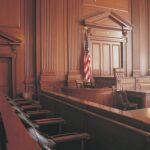
The late Frank X. Gordon Jr.’s comment about the impeachment of President Bill Clinton more than 20 years ago is timeless as it holds true today in the instance of President Donald Trump.
“They’re really not legal proceedings,” Gordon said of impeachment. “They are political proceedings.”
The man who grew up in Kingman and served the Arizona Supreme Court from 1975 to 1992 was Chief Justice when he presided over the impeachment trial of former Governor Evan Mecham in 1988. Ten years later Gordon said he had no doubt of Mecham’s guilt.
“In fact he used what was determined to be state money for his own benefit in his car dealership. He took $80,000 that was in a public fund and loaned it to his car dealership. That was taking state money and using it for his private purpose,” Gordon said of Mecham. “That in fact is misuse of his office to improve his financial position.”
Gordon died in Phoenix on January 6 at the age of 90 and he’ll be laid to rest Friday at Mountain View Cemetery in Kingman. He earned degrees at Stanford and the University of Arizona before returning to Kingman to practice law in 1954.
“I was the city attorney for two years and that two years was a very important part of the town’s history because that is when they adopted all of their major ordinances, which is zoning and planning and ll of the laws,” Gordon said. “I was paid $100 a month for my work.”
Gordon was appointed as a Mohave County Superior Court Judge in 1962. He said he had to take his gavel and robe on the road to learn the law and hone his craft.
“Because my caseload was so light I tried cases all over the state in all but two counties,” Gordon said. “When I was sworn in as a judge they didn’t have any indoctrination for me. They didn’t have any books of procedure…so I went to all places to find out what other judges did and what I could do in my Court.”
Over time, Gordon absorbed Arizona law and the state’s legal history. He spoke in awe and marveled at the crafting of the state Constitution.
“The public in Arizona was very careful to protect itself against abuse of power—initiative, referendum, recall–and recall was one of the reasons why our first Constitution was rejected by the President of the United States. When they saw recall of even judges being in the draft of the Constitution, I think it was (President) Taft, he said ‘no, sorry’ we won’t accept that as a Constitution for your state. We won’t admit the state to the Union until you take that recall provision of judges out of there. We want a true, free and independent judiciary.
Well, reluctantly the state Commission removed the words ‘recall of judges’ from that and we were admitted to statehood in 1912, when immediately afterwards they passed another Constitutional amendment putting it back in. So we’re very, very historically zealous of the people’s power. We want to keep the people’s power and control over public officials. And it’s good and it’s great. We have what I consider some of the best leaders in this state because of the strength of the public’s control over them and I think we probably have one of the strongest Constitutions that controls public officials that there is in the United States.”
The legal scholar and historian with an impressive career of achievement was also humble, homespun and full of life. Knowing that many judges sacrificed social frivolity for reclusive lifestyles, Gordon decades ago arranged an annual drinking, fishing and camping trip—exclusively for judges.
“These guys could let their hair down, play poker and enjoy themselves. It was fun,” Gordon said. “And it grew. We have over ten judges from all over the state there and it became quite an honor to be included in it.”
Being a cantankerous prankster was part of Gordon’s makeup. Drawing roaring laughter when speaking in Kingman in 2012, Gordon recalled conspiring with his judicial assistant to plant a dozen marijuana seeds at the front entryway of the home of a prominent Kingman doctor long ago.
“Well, several weeks and maybe a month or more went by and we all forgot about that and Joan (Gordon’s wife) went to the house one time to play cards or something and looked right next to the door and there were these beautiful, luxurious plants about that (gesture) high,” Gordon said. He took the farce further, involving the sheriff to raid the doctor’s Halloween party for a whimsical pot bust.
“I want you to come in full dress—your jacket, your star, your pistol, and everything—I want you to come up there and grab this marijuana. He says ‘I can’t do that without a warrant’. I said ‘I’ll give you one.'”
Gordon characterized the hoax as the shenanigans of a small town judge, with little else to do.
- Dave Hawkins










